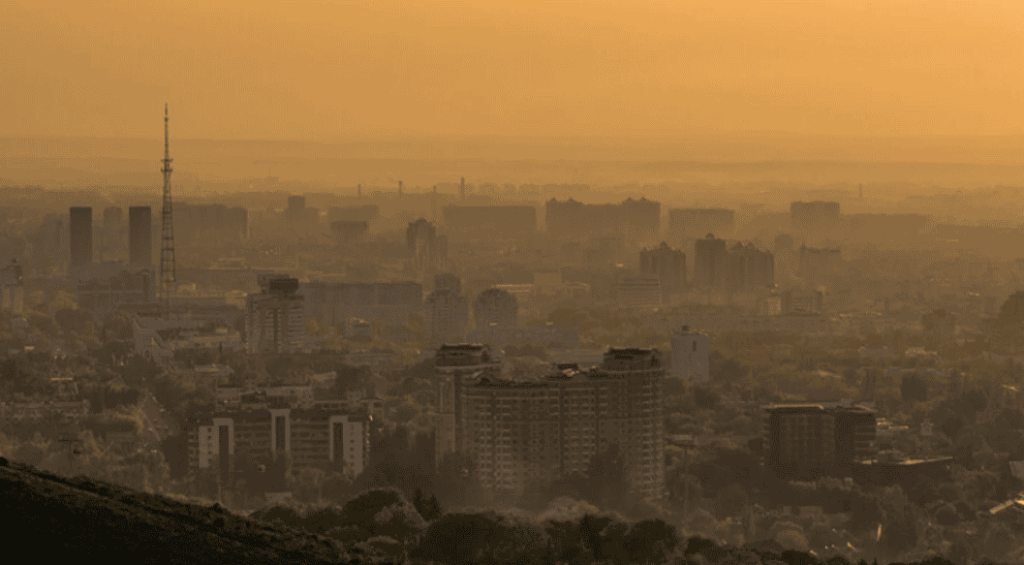Worldwide, air pollution is an “equal opportunity offender” impacting high-, middle-, and low-income countries. While low- and lower-middle-income countries bear the brunt of air pollution, middle- and upper-middle-income countries in Europe and Central Asia are also significantly affected. With growing urbanization, they face increasing public health impacts caused by dirty air.
Across the region, in cities like Bishkek, Tashkent, and Skopje air pollution often spikes to dangerous levels, especially in winter. Its main culprits are emissions from industry, transport, residential heating, and windblown dust. Together, they contribute most of fine particulate matter (PM2.5 ) whose small particles get into the lungs and bloodstreams and cause respiratory illnesses, heart disease, and cancer among many other health impacts. In the most polluted countries in Europe and Central Asia, in 2021, dirty air was behind 9% to 20% of deaths from non-communicable diseases and one in five children’s deaths under the age of one.
Wildfires fueled by rising temperatures and prolonged droughts, are also increasingly polluting air and are becoming more frequent and intense. According to a recent study, in Central Europe, about 1.37% of all cardiovascular deaths in 2000-2019 was attributable to wildfires, which emit not only PM2.5 but also black carbon and volatile organic compounds spreading across vast distances and borders. By 2030, extreme fire seasons in Southern Europe are projected to increase 10 times.
ANNUAL AVERAGE PM2.5 CONCENTRATIONS IN EUROPE AND CENTRAL ASIA ESTIMATED FROM SATELLITE, SIMULATIONS, AND MONITOR-BASED SOURCES

Source: https://sites.wustl.edu/acag/datasets/surface-pm2-5/#V6.GL.02.
Bad Air = Big Costs
Air pollution isn’t just a health issue: it is also a significant drag on the economy. In Armenia, Bulgaria, and the Western Balkans, its costs are equivalent to 13–19% of GDP. Even in less urbanized Central Asia, dirty air contributes to losses equal to 3–5% of GDP and to 65,000 premature deaths per year.
COST OF OUTDOOR POLLUTION IN EUROPE AND CENTRAL ASIA

Source: World Bank estimate of the cost of outdoor air pollution as a percentage of GDP equivalent based on the Global Burden of Disease 2021 assessment and the World Bank valuation of air quality impacts.
Air pollution also leads to productivity losses. According to OECD, even a tiny increase of just 1 µg/m3 (one millionth of a gram in one cubic meter of air) in PM2.5 concentrations can decrease productivity by more than half a percent as people get sick, miss work and their mental and physical abilities decline. Medium-sized companies in the polluted areas are mostly vulnerable, they could lack resources to invest in adaptive solutions. These firms are often engaged in outdoor work, like construction, or rely on highly skilled employees whose productivity depends on cognitive performance.
What Can be Done
Effective air quality management (AQM) requires strong policies that place clean air at the center of national economic agendas. This includes enforcing emission standards for vehicles, industries, and power plants; repurposing subsidies; and creating incentives to promote cleaner energy and greener cities.
Stronger regulation and institutional capacity coupled with intersectoral coordination can make cities more livable, attract investment and create jobs in sectors like clean energy, public transport, environmental management, and urban planning. Just switching to clean energy could create 10 million jobs by 2030 globally.
Europe is already making great strides with strong policies and investments. As a result, in 2000-2022, the EU’s environmental goods and services sector grew 120%—much faster than the rest of the economy. Jobs in AQM and energy efficiency grew more than 400%.
What Europe and Central Asian Countries Are Doing to Improve Quality of Air
Countries across Europe and Central Asia with support from the World Bank are following the EU’s lead toward reducing air pollution. We’re helping governments strengthen laws, institutions, and governance and embed AQM into their national development agendas. For example, Bulgaria is developing national air pollution control programs aligning local and national policies for effective AQM.
The countries are also building air quality know-how. Recent regional, national, district, and city-level studies identify air pollution sources and needed policy, investment, and interventions to build robust AQM systems. And this knowledge is backed by nearly $1.2 billion in the World Bank financing of air quality and wildfire management projects. For example, Bosnia and Herzegovina, the Kyrgyz Republic, and Poland are working to make their residential heating and transport cleaner, AQM stronger, and cities greener; and Türkiye is implementing projects to reduce industrial emissions and protect forests from fires.
Air, as a public good, knows no borders. With the World Bank’s support, countries in Europe and Central Asia are also strengthening their cross-border dialogues and intersectoral knowledge exchange toward shared clean air goals.
This is a great start, but more needs to be done to take advantage of the economic opportunity offered by efforts to clean up the quality of air. It will take sustained political will, investment, and collaboration, and we stand ready to support countries in doing just that.
Source : World Bank







































































